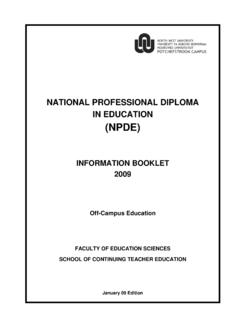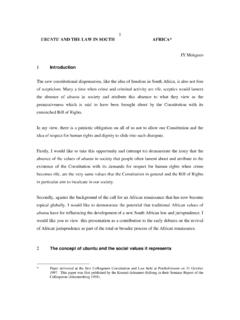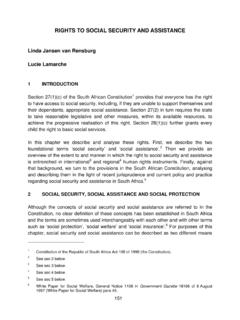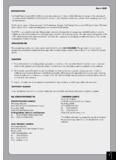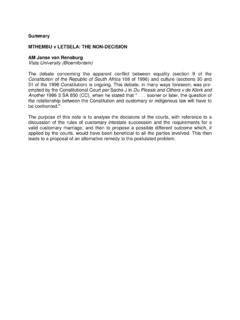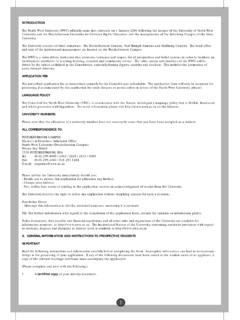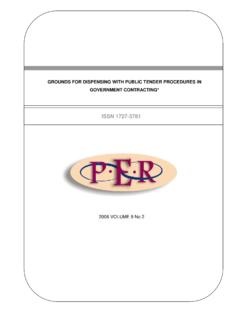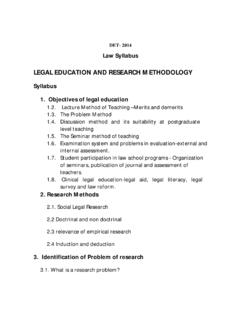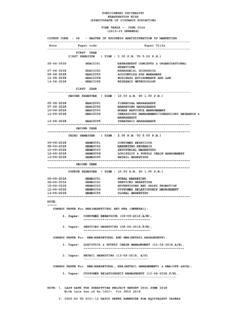Transcription of A SELF HELP GUIDE - puk.ac.za
1 A self help GUIDE . research methodology . AND. DISSERTATION WRITING. 2007. Compiled by: Prof W du Plessis 27. 1. research METHODS. Venter F ea Regsnavorsing: metode en publikasie (Cape Town 1990) 161- 205 (legal historical method), 206-244 (legal comparative method), 245-281. (empirical method). David R & Brierly JEC Major legal systems in the world today: an introduction to the comparative study of law (London Stevens 1978). Zimmermann R "Synthesis in SA private law: civil law, common law and usus modernus pandectarum 1986 SALJ 259-264. Zweigert K and K tz H Introduction to comparative law (Oxford Clarendon Press 1987). There are various methods one can use to obtain research results. The choice of the specific method will depend on the aim that you have with your research and the results that you want to achieve. It might be that you want to give a systematical description of a specific legal problem and the legal material that might give a solution to the problem.
2 In this you can make use of legal text books, law commission reports, legislation and court decisions. In this study you may want to purely reflect the South African legal position. This study method will be fine for an assignment of an undergraduate student who completes his or her B Juris or LLB. In achieving a master's degree a student must however be able to indicate that he or she has the ability to do higher level research and is able to use the various legal research methods and tools. One or more methods or a combination thereof can be used. One can place the research in perspective by making use of legal philosophy or the legal historical method or a combination thereof. If there is a problem in the interpretation of a specific South African legal rule or if there are problems in implementing a certain legal rule or legislation a person may make use of other legal systems to find solutions for the application of the rule or legislation. These solutions may also be found in philosophy or legal history.
3 Again a combination of methods can be used. Since 1994 South Africa has a Bill of Rights - several fundamental rights are included in this Bill. In order to interpret these rights the courts refer to court decisions in India, Canada, Germany etc. They make use of the legal comparative method to find solutions for the South African interpretation of fundamental rights. Sometimes they adapt these interpretations to the specific South African problems created by a different legal and social history. Depending on the problem that you are going to research , you have to find the method that will help you achieve the best research results. 28. Three methods will briefly be referred to and hints given to help you in your research . In the end you have to do the research and find the solutions. The three methods that will be referred to are the legal comparative method legal historical method and the empirical method. Choose a topic that you think you would like to research for the LLM of your choice.
4 Even though this might not be your final topic for your research paper, use this topic as background against which you read the following material. LEGAL COMPARATIVE METHOD. Read the following and think which legal systems would be appropriate to use with regard to your topic of research and how you would go about using the legal comparative method. The legal comparative method is the comparison of different legal systems with each other. Different legal families can be distinguished namely (a number can be added that is not traditionally referred to in handbooks): Anglo-American systems ( USA, Nieu-Zealand, Australia, UK). Roman-Germanic systems ( European legal systems). Mixed legal systems ( South Africa, Canada, Zimbabwe, Botswana. Lesotho). African and other traditional legal systems ( African customary law, customary law of the Maori, Eskimo, Indian tribes in USA and Canada etc). Religious systems ( Hindu, Jewish and Islamic law). Eastern European legal systems ( Russia).
5 Eastern legal systems (Chinese and Japanese law). South American legal systems ( Brasilia, Chili etc). 29. The first step will be to know what the general characteristics of legal families are. Read a general book on comparative law such as David and Brierly, Zweigert-K tz or Van Zyl and establish what the general characteristics of the specific legal family are. If you know what the general characteristics are and you know what the purpose of your research is, you can choose a legal system to compare your research to. You have to know why you want to do comparative research - your use of the comparative legal method must have some purpose whether to see if the historical origins of the problem is the same or different, to find solutions for new legal developments or to compare similar legal rules or problems. It might be that the African law and the Anglo-American law might have some similar legal rules or the one can give a solution to the other who lacks a certain rule.
6 The previous regime in South Africa for example made use of Israel's strict security legislation to draft the Internal Security Act of 1984 and the Australian legislation to draft legislation on sectional titles. Our Constitution is compiled from various constitutions all over the world and was adapted to South African circumstances Once you have decided which legal systems you are going to use, you can do the following to obtain more knowledge about the legal system you are researching: 1. First read a general introduction to the specific legal system or a general handbook on the branch of law, for example the law of property. If you are working in a foreign language for example German, read a book on the German law in English before you read the German material - it will help you with your vocabulary on the topic. 2. Then read the books or articles that specifically deal with the research topic. 3. Thus depending on the topic: First read books: general on the law that give you an idea of the cultural, social, economical, political background of the legal system and articles dealing specifically with the topic.
7 Use legal dictionaries for example Hiemstra, Rechtschreibung or Duden. legislation. court decisions; if your choice is an European country (including UK) you should also refer to the European Community and the European Court of Human Rights 30. interviews with knowledgeable people. It usually helps to write the South African section first, because you will then know what the problems or deficiencies in the law are. You will know what to look for in the foreign system. It will also help you to systematise the foreign law, to compare the legal systems by indicating the similarities or dissimilarities and will enable you to propose solutions. LEGAL HISTORICAL METHOD. Read the following and think how you could introduce the legal historical method in your research .. Legal reform implies knowledge of the history of the legal development and legal institutions in the law that has to be reformed. The question is, however what will be needed by legal reformers to accomplish this task.
8 As has been stated above, in legal science theory and practice are interdependent. Legal theories are tested in practice and the practice of the theory. Adjustments are made on both sides. Through the centuries legal measures were tested against the requirements of for example the Bible, the law, authority, nature, reason and the sense of justice. The law gradually became scientific and the lawyers became blind mechanical appliers of the law. Although the law may be applied technically correctly, the possibility exists that it was based on a number of wrong assumptions or on an uncritical take-over of legal norms. To a lay person the law has become strange and confusing. If a lawyer has knowledge of his or her own legal system only, it is easy to sit down and praise the virtues of the existing legal system. That which is wrong, is never seen. The German experience should be regarded as a lesson. Initially after the codification of the German law in 1900, academic lectures were still based on a study of the private law with reference to the Roman law, Pandectists and the Germanic law used as comparative basis.
9 Since 1918 legal education has focused only on the national law and the legal historical and comparative possibilities that are available to adapt the law, was forgotten. Students were not able to critically analyse the law or to be able to resist the German socialist-nationalism. They had no value system against which their own legal system could be tested. Legal history is more than the study of the development of material legal norms. It also includes the analysis of these rules in the light of the external legal history (the economical, cultural, political, social, philosophical and religious development). The development provides answers as to why a legal system has certain characteristics. The lawyer should not be taught only to use the legal history to find the sources of the present day law, but he or she must be able to use his or her knowledge to propose alternatives for legal development - he 31. or she must be able to break through the boundaries of the history as is stated by prof Visser of the University of Cape Town.
10 The purpose of legal historical research is therefore to establish what the development of legal rules are and to propose solutions or amendments to the existing law based on historical facts. This method can be used in isolation or can be combined with other methods. Sometimes a brief history of a legal rule or legislation is given whereafter the application of the rule in the South African law is discussed or the rule is compared to other legal systems or the development within those legal systems. If you research the development of for example a rule of the South African common law, the following method can be used: 1. Establish what the periods in the legal history of South Africa are and establish what the characteristics, main writers and sources of each period are. Make use of your knowledge of legal history or introduction to the law. 2. Establish what the present-day position with regard to the rule in the South African law is. 3. Check the footnote references in South African handbooks and get references to old authorities.

